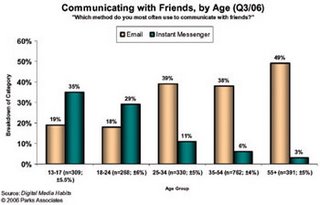Brits turn off TV & radio and put down the paper, turn to broadband
 ...And now for something completely different...
...And now for something completely different...
Well, actually, no. The Brits are rapidly making the switch to broadband Internet usage, just like the U.S. and Canada. And it's impacting traditional media usage there, too. Broadband prices keeping dropping, surging more and more web surfing and viral video watching.
As reported Thursday in the British newspaper The Guardian:A third of internet users in Great Britain watch less television once they have broadband, while 27% read fewer national newspapers and almost a fifth switch off their radios, according to new research from the telecoms regulator Ofcom. The picture is similar across France, Germany, Italy, Japan and the US, highlighting the threat posed by the web to traditional media.
Hmmm, I wonder...will Brits read this story online before they see it in print?
* More than a third of British internet users have watched TV, movies or film trailers over broadband.
* Across all age groups, 34% of British broadband users have looked at user-generated content while 38% have watched the news online.
* British youth are the most web-savvy in the country - of those aged 18 to 24 with broadband, 77% have downloaded a music video...and 60% have watched TV over the web.
British web users turn away from TV and national newspapers once they have broadband but although 17% say they listen to less traditional radio, 43% listen to radio on the web at least once a month, similar to the trend on the continent.
Only 19% of British web users make phone calls over the internet at least once a month compared with 30% in France and 37% of users in Germany. Brits are also more reticent about using websites to meet, chat and make friends.
Despite the turn away from old media such as the BBC, the report shows 64% of British consumers believe public service broadcasting is "definitely necessary".
posted by Unknown @ Wednesday, November 29, 2006,
,
![]()
![]()
Wikis: The Future For Espionage?
Labels: Jointblog Former Russian spy Alexander Litvinenko -- who died by suspicious poisoning in London last week -- might still be alive if he were an anonymous poster using a Wiki instead.
Former Russian spy Alexander Litvinenko -- who died by suspicious poisoning in London last week -- might still be alive if he were an anonymous poster using a Wiki instead.
Imagine James Bond not with a gun but a blog.
Or Spy vs. Spy...hmmm, maybe that's the purpose of Gawker.com or TMZ.com.
Apparently the U.S. Intelligence community believes wikis are the key to the future of espionage. Recently, the government agency said it's creating its own secretive version of Wikipedia, the popular online encyclopedia anyone can edit (with certain reservations). That kind of openness will be key to sharing sensitive information, U.S. Intelligence czar John Negroponte said. Called Intellipedia, the new service will allow intelligence analysts and other officials to collaboratively add and edit content on the government's classified Intelink Web, which is basically the World Wide Web for U.S. Intelligence. The "top secret" Intellipedia is available to the 16 agencies in the U.S. Intelligence community, enabling the disparate agencies, which once existed in silos, to actually share information with one another.
Called Intellipedia, the new service will allow intelligence analysts and other officials to collaboratively add and edit content on the government's classified Intelink Web, which is basically the World Wide Web for U.S. Intelligence. The "top secret" Intellipedia is available to the 16 agencies in the U.S. Intelligence community, enabling the disparate agencies, which once existed in silos, to actually share information with one another.
The service has been around since April 17 and has already grown to 28,000 pages and 3,600 registered users. It's currently being used to develop a report on Nigeria, which is the home of nearly one-fifth of the crude oil the U.S. imports from overseas. Negroponte and others say Intellipedia may one day be the tool intelligence officials use to produce the president's daily intelligence briefing. Security concerns are outweighed by the instant availability of classified information. Of course, we know how well the government responds to those DIBs...
Of course, we know how well the government responds to those DIBs...
...waitaminute, if this story has been reported by Reuters, just how "top secret" is it?
What is this...ACME reports in the hands of Wile E. Coyote?
Will they post Britney sightings?
posted by Unknown @ Monday, November 27, 2006,
,
![]()
![]()
Baby Boomers Think TV No Longer Targets Them
Labels: Jointblog The Big Generation. The Me Generation. The More Generation. The Baby Boomers.
The Big Generation. The Me Generation. The More Generation. The Baby Boomers.
America's biggest demographic remains the Baby Boomers -- Madison Avenue's premium consumer target. Until recently.
A strange thing started to happen in the past couple of years. They started to turn 60.
While Dennis Hopper is doing ads saying Boomers will redefine retirement, the reality is they are retiring. Media has been shifting its focus away. Boomers are starting to realize they aren't media's most-prized demo. Boomers think TV no longer targets them. And it doesn't make Boomers happy.
Traditional mainstream media -- such as TV and radio -- has radically altered their programming choices to anything with younger appeal. Aging Hipsters still pack plenty of consumer wallop...and it appears they are starting to get irritated no longer being TV's Most Important Consumer.
Aging Hipsters still pack plenty of consumer wallop...and it appears they are starting to get irritated no longer being TV's Most Important Consumer.
The Associated Press reports:Americans born between 1946 and 1964 are accustomed to being catered to, but that's not the case with much of television today. Now there's some new evidence that they're finding this mighty irritating. A study conducted by Harris Interactive suggests that the television industry's obsession with youth is backfiring.
With so much of media turning away from still-lucrative Boomers, it sounds like opportunity to me. Nearly two-thirds of Americans say they believe that most TV programming and advertising is targeted toward people under 40, the survey said. More than 80 percent of adults over 40 say they have a hard time finding TV shows that reflect their lives. A significant number of baby boomers - 37 percent - say they aren't happy with what's on television, according to the study.
Nearly two-thirds of Americans say they believe that most TV programming and advertising is targeted toward people under 40, the survey said. More than 80 percent of adults over 40 say they have a hard time finding TV shows that reflect their lives. A significant number of baby boomers - 37 percent - say they aren't happy with what's on television, according to the study.
The theory among advertisers is that it's important to reach young people as their preferences are forming - get them hooked on a certain toothpaste or soda early and they'll be hooked for life. Advertisers will pay a premium for young viewers: $335 for every thousand people in the 18-to-24 age range that a network delivers, for example. Viewers aged 55-to-64 are worth only $119 for every thousand, according to Nielsen Media Research.
From a financial standpoint, if you're 50 or over, you currently mean nothing to those networks' executives. Can websites like Eons.com catch Boomer -- and Madison Avenue -- attention? Will Boomers allow being forcibly retired from TV programming geared to them? Can Boomers make "35-64" the new "18-49"?
Can websites like Eons.com catch Boomer -- and Madison Avenue -- attention? Will Boomers allow being forcibly retired from TV programming geared to them? Can Boomers make "35-64" the new "18-49"?
To read more, click here
posted by Unknown @ Sunday, November 19, 2006,
,
![]()
![]()
10 Year Post-TeleCom Buildup Is A Sell Out: Old Media Now Tearing Down And Going Private Again
Labels: Jointblog In business, cashing in and cashing out is just another day at the office.
In business, cashing in and cashing out is just another day at the office.
The TeleCom Bill of 1996 was a watershed piece of legislation for media companies. Ownership rules opened up, leading to a wave of merger & acquisition and IPO never before seen. Suddenly, America's media was owned and dominated by just a few companies...and government did little to challenge or limit the buying. Media companies lobbied all kinds of promises to shareholders, audiences and advertisers, saying "bigger was better", leading to new positioning power and improved products.
Small fish were eaten by bigger fish which were eaten by even bigger fish until the chum was gone. (Literally. Bell Globemedia bought Canada's CHUM group this past summer.)
Going public was the media mantra. IPO it. Get it to Wall Street. Go make the money.
Aw, weren't the last 10 years quaint? Now, going private is the new mantra. Is it a Sarbanes-Oxley response or just purely The Street? More than a year ago, Joint Communications was one of the first media strategists to encourage media companies (especially old media) to break away from Wall Street and become private again. Since then, Emmis has pursued it. The Tribune Co. is exploring it.
Now, going private is the new mantra. Is it a Sarbanes-Oxley response or just purely The Street? More than a year ago, Joint Communications was one of the first media strategists to encourage media companies (especially old media) to break away from Wall Street and become private again. Since then, Emmis has pursued it. The Tribune Co. is exploring it.
And now, the largest radio company in the world -- Clear Channel, with $5 billion in annual total revenue -- is doing it. For a tune estimated between $16-to-$28 billion, depending on which math you use and how profitable selloffs end up. Of course, the trends that drive companies to go public or private are somewhat cyclical, but what's new in the media space this time around is private equity's ability to lay its hands on bigger and better media brand names.
Of course, the trends that drive companies to go public or private are somewhat cyclical, but what's new in the media space this time around is private equity's ability to lay its hands on bigger and better media brand names.
One thing is clear with this week's Clear Channel announcement: Media companies may be in the communications business, but it appears they're increasingly tired of talking to the Street.
And now, it looks like government is starting to weigh in, with Senator Russ Feingold stating Clear Channel is the poster child for media consolidation's ill-conceived experiment."
Even VNU -- owner of old media ratings service ACNeilsen and old media publications like Billboard with their old media weekly charts -- went private this summer for a gazillion dollars. And the Dolans of Cablevision are still looking to get private.
With digital chaos rapidly upending old business models and analysts ga-ga over the likes of Google and MySpace, going private is the emerging business model for traditional media firms. AdAge has it right:
AdAge has it right:Of course, the trends that drive companies to go public or private are somewhat cyclical, but what's new in the media space this time around is private equity's ability to lay its hands on bigger and better media brand names. In just the past few weeks, stalwart old-media names such as Clear Channel, Cablevision, the Los Angeles Times and The Boston Globe all have been targeted by private-equity buyers. And a flurry of rumors are surrounding the likes of Viacom, the New York Times Co. and Martha Stewart Living Omnimedia, which actually got a bit of a boost to its share price last week thanks to the speculation.
Spending every minute thinking about radio clients and the company's audience and not spending any more time justifying stock value to Wall Street is the new med trend.
The Mays family, which founded Clear Channel, likely is frustrated by Wall Street's limited view of growth opportunities for radio. It's a common complaint among CEOs who can't grasp why their stocks are down, and one most often made by family-run businesses, which may only have gone to the public market in the first place as a way to satisfy family members looking to cash out.
And it's about time. Now that the cashing out has begun, maybe we will tune back in and quality can return. Private investors will insist their new purchases perform.
What impact will Clear Channel's sale taking the company private have on the radio industry? The deal will be watched and analyzed to death by media trend watchers between now and its finalization, but what about the rest of the industry? How wil other public react? Will they go private, too, as has been predicted by some? What impact will it have on radio and how radio operates?
Joint Communications CEO John Parikhal will speak at the FORECAST '07 conference December 5 at the Harvard Club in New York, looking into radio's future along with other radio leaders. The Jointblog will post highlights.
Read more here
posted by Unknown @ Friday, November 17, 2006,
,
![]()
![]()
Investing in the Internet property boom with SecondLife
Labels: Jointblog For the past 2 months, SecondLife.com, the three-dimensional virtual world, has been getting tons of press. And a fast-growing new user base, signing up almost 1.4 million members (over 400,000 since September). A second life, so to speak, since it's actually been around since 2003. With SecondLife, it's your world, your imagination. And we all get to live in it.
For the past 2 months, SecondLife.com, the three-dimensional virtual world, has been getting tons of press. And a fast-growing new user base, signing up almost 1.4 million members (over 400,000 since September). A second life, so to speak, since it's actually been around since 2003. With SecondLife, it's your world, your imagination. And we all get to live in it.
Plus you can fly!
Web 2.0 is suddenly pouncing on it. This week, Fortune says SecondLife is not overhyped as the next hot thing post-Google, post-MySpace.
BusinessWeek put SecondLife on its cover in October, saying Big Media's land grab is well under way.
ClickZ shows how to live a new (virtual) life. The Wall Street Journal even says advertising agencies are recruiting new talent and holding virtual meetings online using their avatars.
The Wall Street Journal even says advertising agencies are recruiting new talent and holding virtual meetings online using their avatars.
But what is SecondLife?
In SecondLife, the online realm where real people, under the guise of avatars, mill and mingle, change clothes in front of each other while chatting, and, in some cases, make a living. The game's audience is growing at about 38% month over month, expecting to add 200,000 to 250,000 new players -- many of them the coveted younger early adopters -- in October alone. Wired magazine says "Second Life is almost a phenomenon like [video site] YouTube, it's reached critical mass." SecondLife is succeeding spreading its buzz in a unique way: it "builds" virtual office towers of real-life media companies within its fabricated world. Reuters' island. Wired's digitized headquarters. C|net's replicated 5-story new glass-and-brick office. To be seen, media companies are "buying" with their "Linden dollars" real estate and building big.
SecondLife is succeeding spreading its buzz in a unique way: it "builds" virtual office towers of real-life media companies within its fabricated world. Reuters' island. Wired's digitized headquarters. C|net's replicated 5-story new glass-and-brick office. To be seen, media companies are "buying" with their "Linden dollars" real estate and building big.
Meanwhile, The W Hotel opens a new hotel. And IBM's CEO can be seen walking the city sidewalks. I wonder if this is where we'll find former Viacom CEO Tom Freston, since he has more time for his personal travel desires? He may already be there.
What I wonder is will we find XM or Sirius satellite radio there before we hear terrestrial radio stations? It seems like a natural to hear Howard Stern within the SecondLife world. Or for either satellite radio service to dedicate one of their channels into a SecondLife channel, broadcasting the site's virtual "life" complete with fake news, gossip, music and happenings with real marketing messages.![]() Maybe we could even see Howard Stern's avatar broadcasting from his studios on a virtual Howard TV broadcast and be in his virtual audience.
Maybe we could even see Howard Stern's avatar broadcasting from his studios on a virtual Howard TV broadcast and be in his virtual audience.
Media is beginning to merge in reality and virtual.
Reuters' new agency has even assigned a real-life news reporter to cover the "news" happening within the SecondLife world. And he gets interview requests from around the world. That's smart.
The user population is represented by interactive graphic avatar characters, offering a new opportunity for marketing companies to communicate with users online. For example, if you go, for instance, to Sony Music's island, you can enter a Christina Aguilera room, and watch her latest video (while your avatar sits in an easy chair, of course).
So, Sony benefits from both your avatar's exposure to marketing but also the direct user.
Is this the world of virtual marketing, shrinking the Sims gap into something more real? Is it a game? No. Is it a marketing opportunity? Sure.
SecondLife is not easy to use. It's complex. And requires a powerful personal computer in free memory and processing space to use it. It reportedly has many problems getting past office firewalls (which may be a good thing for company productivity rates). Those challenges bring on the gamers who want to "figure it out" and learn the system so they can beat it. And yet, it is not a game, it's an evolving experience.
For users, it's just a place you go to do whatever you want to do. For marketers, SecondLife may be more than just good PR and increased visibility. It really may represent an fresh alternative vision for how to interact with information, communicate over the Internet...and make the virtual world even more real.
posted by Unknown @ Monday, November 13, 2006,
,
![]()
![]()
Republicans Lose Big in Election; Meanwhile FCC Approves Swearing on Live News Programs
Labels: Jointblog If Pennsylvania Republican Rick Santorum accidently said the F-word live on TV or radio last night after learning he -- and dozens of other Republicans -- lost their election campaigns, it certainly would be understandable.
If Pennsylvania Republican Rick Santorum accidently said the F-word live on TV or radio last night after learning he -- and dozens of other Republicans -- lost their election campaigns, it certainly would be understandable.
Santorum got voted out of Congress in yesterday's elections. Meanwhile, the FCC announced earlier yesterday no broadcast company would get fined for swearing slipups on live newscasts anymore. Senator Santorum -- a leading conversative "family values" advocate against obsence content and language on broadcast media, including a personal agenda against Howard Stern and other radio personalities -- introduced new laws increasing obsensity fines by the FCC against broadcasters tenfold.
Senator Santorum -- a leading conversative "family values" advocate against obsence content and language on broadcast media, including a personal agenda against Howard Stern and other radio personalities -- introduced new laws increasing obsensity fines by the FCC against broadcasters tenfold.
Yesterday, just in time for the election, the FCC made a new ruling change, saying it was okay if words like @*%&?#! slip onto news shows, as has happened occasionally when Opie and Anthony pests assault local live reporters delivering their news reports.
Does this give the O&A pests a green light?
The legalities of network TV obscenity have grown more complicated than the old "Seven Dirty Words," and broadcasters have increasingly complained the new rules don't make any sense. But this week, they have some clarity on the rules.
What's not acceptable on TV: "I'd like to thank the @*%&?#! academy." What's acceptable on TV: "That's @*%&?#! ridiculous, Katie Couric." Yesterday's Los Angeles Times has the story.
The commission's website has PDFs of a press release announcing the ruling, the text of the full ruling and a commissioner's statement on the ruling. If you've ever wanted to read a bunch of expletives next to a bunch of federal government legalese, these documents are for you.
posted by Unknown @ Wednesday, November 08, 2006,
,
![]()
![]()
YouTube Honesty: Faith Hill Freaks Out Losing On CMAs
Labels: Jointblog Celebrities are so pre-programmed, pre-packaged in this 24/7 digital media world, honest reactions when stars lose at live Award shows are rare to come by. Stars know the world is watching. Mostly, we see (and expect) stars to smile politely at the camera like a good sport. Be genteel. Be a good sport.
Celebrities are so pre-programmed, pre-packaged in this 24/7 digital media world, honest reactions when stars lose at live Award shows are rare to come by. Stars know the world is watching. Mostly, we see (and expect) stars to smile politely at the camera like a good sport. Be genteel. Be a good sport.
But when you lose to some upstart American Idol?
"What?"
Just watch Faith Hill react to losing on live TV last night on the CMAs thanks to YouTube, now available for sweet viral video replay around the world, over and over and over...
Now that's an honest reaction.
posted by Unknown @ Tuesday, November 07, 2006,
,
![]()
![]()
Major Broadcast Group Corus Launches Broadband Radio Station For Teens
Labels: boomboxbaby.ca, Corus, Jointblog, Radio, Teens Traditional broadcast radio may be starting to remember that teens actually like radio, represent a huge population base, and are attractive consumers for advertisers. Radio just needs to distribute and produce its programming the way teens want to consume it.
Traditional broadcast radio may be starting to remember that teens actually like radio, represent a huge population base, and are attractive consumers for advertisers. Radio just needs to distribute and produce its programming the way teens want to consume it.
After all, that cellphone, wireless pda and even iPod are just modern versions of "receivers". All are devices broadcast radio has been slow to adapt to and embrace.
Maybe that is changing. In a move that marks a Canadian market first -- and perhaps a North American first -- Corus Radio announced the launch of an interactive youth radio station over broadband on November 6.
In a move that marks a Canadian market first -- and perhaps a North American first -- Corus Radio announced the launch of an interactive youth radio station over broadband on November 6.
Carrying a mix of eclectic music-ranging from Top 40 and indie rock to hip hop and rap -- with programming hosted by teens and young adults, BoomBoxBaby.ca features personalities and content from Corus Entertainment's powerhouse brands YTV (Canada's version of Nickelodeon), children's publisher Kids Can Press and Corus Radio -- the largest broadcast radio group in Canada). The new radio station, targeted at younger teens aged 12-17, broadcasts exclusively on the web with user-generated on-air content. When it comes to opportunity, creating better content for teens has a way better upside for radio's overall health and future success. Tailoring today's radio for the devices teens actually use right now (cellphones, pdas, computers) is a good idea most boradcasters choose to ignore. Better than HD or other gadget attempts. Combined with Canada's (and maybe the U.S.'s) efforts to make cities open WiFi hot spots allowing Internet radio to be heard wirelessly, this makes complete sense.
The new radio station, targeted at younger teens aged 12-17, broadcasts exclusively on the web with user-generated on-air content. When it comes to opportunity, creating better content for teens has a way better upside for radio's overall health and future success. Tailoring today's radio for the devices teens actually use right now (cellphones, pdas, computers) is a good idea most boradcasters choose to ignore. Better than HD or other gadget attempts. Combined with Canada's (and maybe the U.S.'s) efforts to make cities open WiFi hot spots allowing Internet radio to be heard wirelessly, this makes complete sense.
When was the last time a large broadcast radio group launched a new initiative targeting teens and valuing them as a potential audience? College radio stations have plugged into their university cable and Internet lines for years. Now maybe commercial radio can wake up to the potential.
This webcast joins Iceberg Radio, operated by Standard Radio, as another major webcast initiative from a Canadian terrestrial broadcast group. Corus, like Standard, now has a major online presence more developed than any American broadcaster except perhaps Clear Channel.
Can this start a new media trend and wake up the industry?
By the way, if you're interested in locating a broadcasting radio station to see if they are streaming on the web, here's an easy radio station locator.
To read more about BoomBoxBaby, click here.
posted by Unknown @ Monday, November 06, 2006,
,
![]()
![]()
US Teens Prefer IM over Email
Labels: Jointblog A new Parks Associates study finds that U.S. teenagers now prefer instant messaging to email. Less than one-fifth of those surveyed between the ages of 13-17 use email as their primary method of communication with friends, compared to almost 40 percent of adults aged 25-54.
A new Parks Associates study finds that U.S. teenagers now prefer instant messaging to email. Less than one-fifth of those surveyed between the ages of 13-17 use email as their primary method of communication with friends, compared to almost 40 percent of adults aged 25-54.
As seen in the chart above, those ages 24 or younger prefer instant messenger to communicate with friends, while those 25 and over greatly prefer email.
posted by Unknown @ Sunday, November 05, 2006,
,
![]()
![]()















